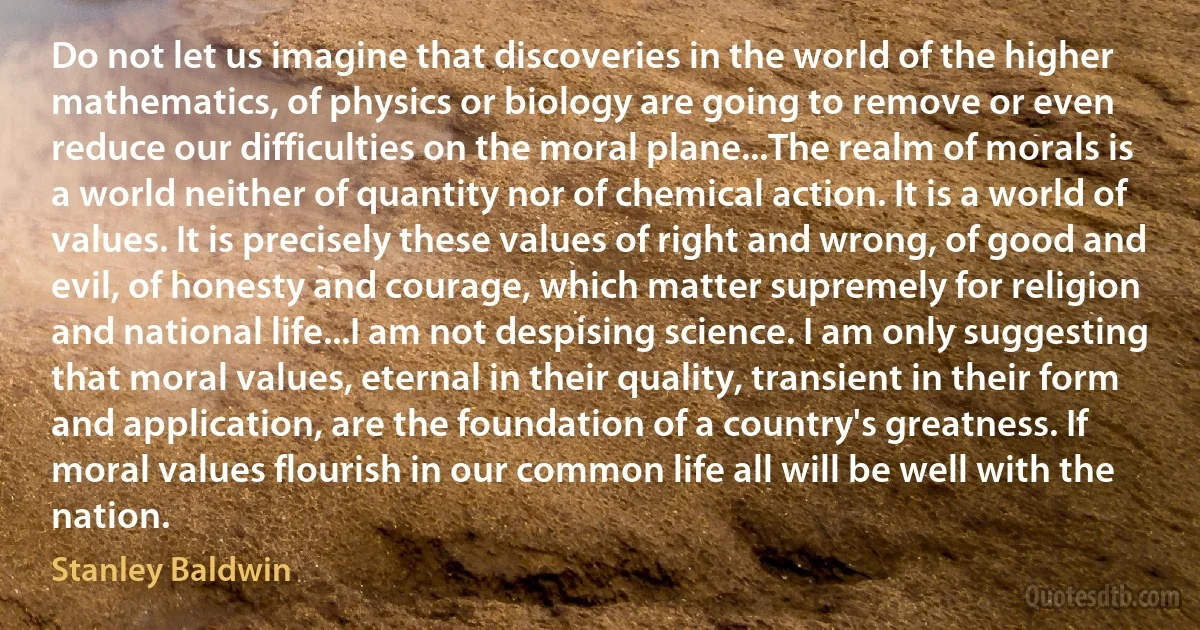
Do not let us imagine that discoveries in the world of the higher mathematics, of physics or biology are going to remove or even reduce our difficulties on the moral plane...The realm of morals is a world neither of quantity nor of chemical action. It is a world of values. It is precisely these values of right and wrong, of good and evil, of honesty and courage, which matter supremely for religion and national life...I am not despising science. I am only suggesting that moral values, eternal in their quality, transient in their form and application, are the foundation of a country's greatness. If moral values flourish in our common life all will be well with the nation.
Stanley BaldwinRelated topics
action biology chemical common courage despising difficulties evil form good greatness honesty life mathematics matter nation national nor plane quality religion remove right science suggesting well world wrong higherRelated quotes
In its conception the literature prize belongs to days when a writer could still be thought of as, by virtue of his or her occupation, a sage, someone with no institutional affiliations who could offer an authoritative word on our times as well as on our moral life. (It has always struck me as strange, by the way, that Alfred Nobel did not institute a philosophy prize, or for that matter that he instituted a physics prize but not a mathematics prize, to say nothing of a music prize - music is, after all, more universal than literature, which is bound to a particular language.) The idea of writer as sage is pretty much dead today. I would certainly feel very uncomfortable in the role.

J. M. Coetzee
These Peripatetics accordingly made careful investigations into the nature of all things, so as to determine which I should be avoided as evil, discounted as useless, sought after as good, or preferred as better, and finally which are called "good" or "bad" according to circumstances. There thus developed two branches of philosophy, natural and moral, which are also called ethics and physics. But, through lack of scientific skill in argumentative reasoning, many absurdities were concluded. Thus Epicurus would have the world originate from atoms and a void, and would dispense with God as its author; whereas the Stoics asserted that matter is coeternal with God, and held that all sins are equally grave. p. 76.

John of Salisbury
Though patriotism includes a sentimental, as it were a family, feeling for place, we can distinguish the ethical motive from the sentimental. At certain times in certain countries there has been a moral urgency to be patriotic when the actual or ideal policy of a man's nation has been a sine qua non for his conscience. But to-day patriotism, in so far as it means subordination to a specifically national policy, is superannuated. This war, we assume, is not being fought-not by most of us-for any merely national end; we are fighting it, primarily and clearly, for our lives, and secondarily, and, alas! vaguely, for a new international order.

Louis MacNeice
My visceral perception of brotherhood harmonizes with our best modern biological knowledge. [...] Many people think (or fear) that equality of human races represents a hope of liberal sentimentality probably squashed by the hard realities of history. They are wrong. This essay can be summarized in a single phrase, a motto if you will: Human equality is a contingent fact of history. Equality is not true by definition; it is neither an ethical principle (though equal treatment may be) nor a statement about norms of social action. It just worked out that way. A hundred different and plausible scenarios for human history would have yielded other results (and moral dilemmas of enormous magnitude). They didn't happen.

Stephen Jay Gould
There is very good reason to believe that, in a generation or so, capitalism itself will no longer exist-most obviously, as ecologists keep reminding us, because it's impossible to maintain an engine of perpetual growth forever on a finite planet, and the current form of capitalism doesn't seem to be capable of generating the kind of vast technological breakthroughs and mobilizations that would be required for us to start finding and colonizing any other planets. Yet faced with the prospect of capitalism actually ending, the most common reaction-even from those who call themselves "progressives"-is simply fear. We cling to what exists because we can no longer imagine an alternative that wouldn't be even worse.

David Graeber
